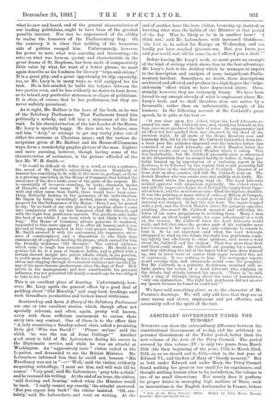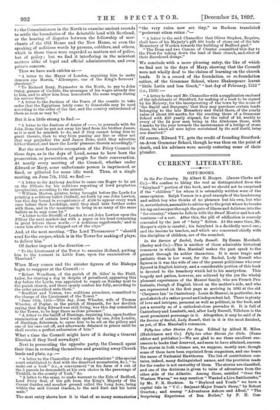ARBITRARY GOVERNMENT UNDER THE TUDORS.*
NOTHING can show the extraordinary difference between the constitutional Government of to-day, and the arbitrary or personal Government of the Tudor period, better than the new volume of the Acts of the Privy Council. The period covered by this volume (IV.) is only two years, from March 25th (the then beginning of the year), 1552, to March 22nd, 1553, or, as we should call it, 1554,—that is, the last year of Ed ward VI., and the first of Mary of "bloody memory." But as both under Edward and under Mary, the Privy Council found nothing too great or too small for its cognisance, and thought nothing human alien to its jurisdiction, the volume is one of no small dimensions. Not merely does it perform its proper duties in managing high matters of State, such as instructions to the English Ambassador in France, letters • Acts of the Priry Council, 1652-4. Edited by John Roche fluent. London Eyre and Spotti.trocde. to the Commissioners in the North to examine ancient records to settle the boundaries of the debatable land with Scotland, or the hearing of disputes between the fellowship of mer- chants of the Old Hanse and the New Hanse, or even the speaking of seditious words by parsons, cobblers, and others, which in those times were regarded as matters not of police, but of policy ; but we find it interfering in the minutest matters alike of legal and official administration, and even
private concern.
Thus we have such entries as :—
" A letter to the Mayor of London, requiring him to make denezen one Martin, Allemayne, one of the King's ferrours ' (furriers)."
"To Richard Buny, Paymaster in the North, to pay to John Oxley, gunner of Carlisle, the arearages of his wages already due to him, and to allow him from henceforth the same wages during his service there."
"A letter to the Justices of the Peace of the countie to take order that the Egyptians lately come to Dunstable may be used according to the order of the law, and the country unburdened of them as soon as may be."
But it is a little strong to find :— "A letter to the Justices of Assize of , to persuade with Sir
John Done that he put not away his land from his brother James, as it is said he mindeth to do, and if they cannot bring him to grant thereto, then to stay from passing any fine or other act that may prejudice the said James Done, until they advertise hither thereof, and know the Lords' pleasure therein accordingly."
But the most favourite occupation of the Privy Council in those days, as in the days of Laud, seems to have been the prosecution, or persecution, of people for their conversation. At nearly every meeting of the Council, whether under Edward or Mary, some unfortunate person is imprisoned, or fined, or pilloried for some idle word. Thus, at a single
meeting, on June 7th, 1552, we find :—
"A letter to Sir Anthony Auchier to cause one Roger to be set on the Pillorie for his seditious reporting of lewd propheties (prophecies), according to the minute.'
"William Marten, printer, being brought before the Lords for printing a seditious ballet (ballad), set forth by one John Lawton, was this day bound in recognizance of 2100 to appear every week once before their Lordships, until they shall take further order with them, and in the meantime to bring in as many of the same ballets as he may come by."
"A letter to the Sheriffs of London to set John Lawton upon the Pillory the next market-day with a paper on his head containing in great letters these words :—` A seditious vagabounde,' and to cause him after to be whipped out of the citye.'
And, at the next meeting, "The Lord Threasourer " "should send for the cooper, which is in the Tower for making of plays, to deliver him."
Of darker import is the direction To the Lieutenant of the Tower to examine Holland, putting him to the torment in Little Ease, upon the examination of Thiirland."
When Mary comes and the sinister figures of the Bishops begin to reappear at the Council:—
"Robert Wendham, of the parish of St. Giles' in the Field, tailor, for shaving a dog in despite of priesthood, appearing this day before the Lords, was appointed to repair on Sunday next to the parish church, and there openly confess his folly, according to the order prescribed unto them."
"Bradfort and Verron, two seditious preachers, committed to the charge of the Lieutenant of the Tower." "June 13th, 1553.—This day, Joan Wheeler, wife of Thomas Wheeler, of Poplar, in the parish of Stepneth, for her devilish saying that King Edward was still living, was this day committed to the Tower, to be kept there as close prisoner."
"A letter to the bailiff of Hastings, requiring him, upon further examination of certain lewd words spoken by one, John London, of Hastings, fisherman, to cause him to be set on the pillory and one of his ears cut off, and afterwards detained in prison until he shall receive a perfect submission of him."
What a time the Council might have of it during a General Election if they lived nowadays!
Next to persecuting the opposite party, the Council spent their time in rewarding themselves and granting away Church lands and plate, e.g.:—
" A letter to the Chancellor of the Augmentations" (the special court established to deal with the dissolved monasteries, &c.), "to make out a book" (i.e., a conveyance) "in fee farm of 4 out of the 5 parcels he demandeth at his own choice in the parsonage of Tickh ill, in the county of York," &c. "A letter to the same, to make warrant to the Erle of Bedford, Lord Privy Beal, of the gift from the King's Majesty of the Covent Garden and meadow ground called the Long Acre, being within the said Covent Garden, to the said Earl and his heirs male."
The next entry shows how it is that of so many monasteries
"the very ruins now are tiny," as Barham translated " perierunt etiam ruham :"—
" A letter to the said Chancellor that Oliver Stephen, Esquire, shall have of his Majesty's gift 400 loads of stone out of the late Monastery of Warden towards the building of Bedford gaol." "The Dean and two Canons of Chester committed this day to the Fleet for taking down the lead of their church, and other of their disordered doings."
We conclude with a more pleasing entry, the like of which we find not in the days of Mary, showing that the Council were not wholly deaf to the claims of learning on the church
lands. It is a record of the foundation, or re-foundation rather, of the Grammar School, where Shakespeare learnt "little Latin and less Greek," "last day of February, 1552 " (i.e., 1553) :— "A letter to the said Mr. Chancellor with a supplication enclosed of the inhabitants of Stratford, for making of a book to be signed by his Majesty, for the incorporating of the town by the name of 'the Baylif and Burgesys ' that they may purchase certain lands belonging to the late Monastery and Guild there, of the yearly value of about 200 marks, for the erecting there of a Grammar School with 220 yearly stipend, for the relief of 4d. weekly to every of the 24 poor men being in the Almhouse there, with 5 marks by the year towards the maintenance of a bridge of stone there, the which all were before maintained by the said Guild, being now dissolved."
Of course, Edward VI. gets the credit of founding Stratford- on-Avon Grammar School, though he was then on the point of death, and his advisers were merely restoring some of their plunder.



































 Previous page
Previous page